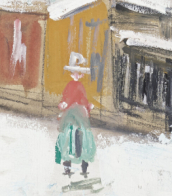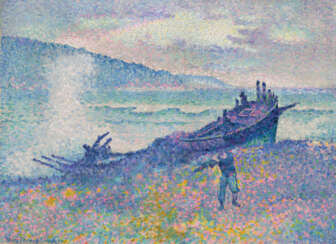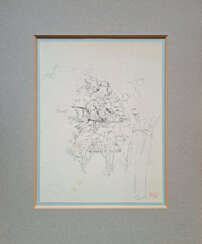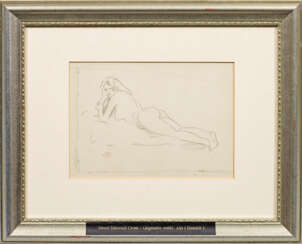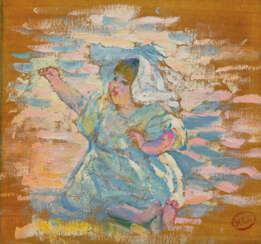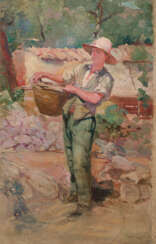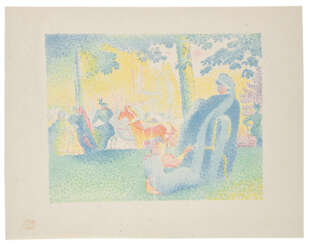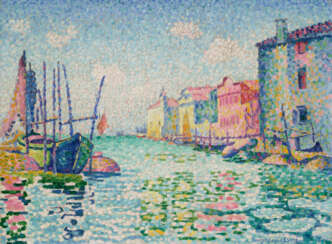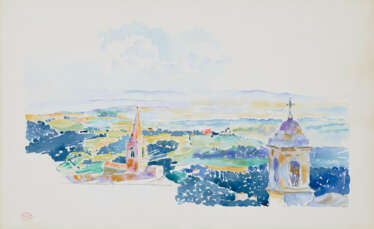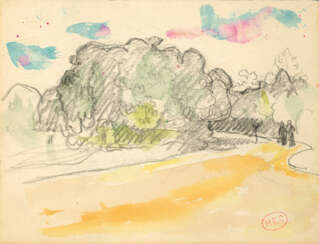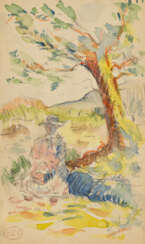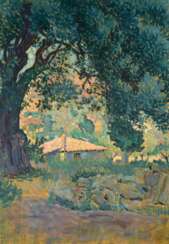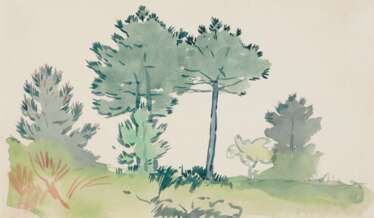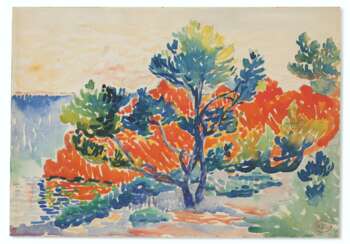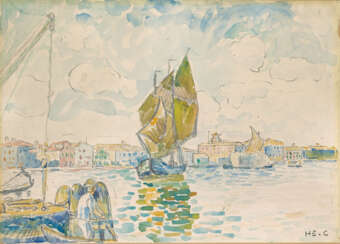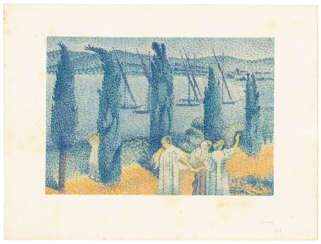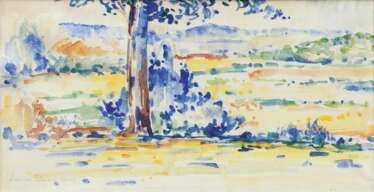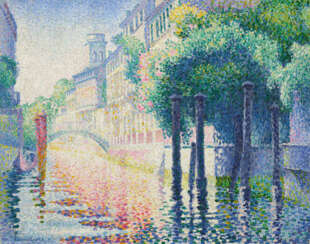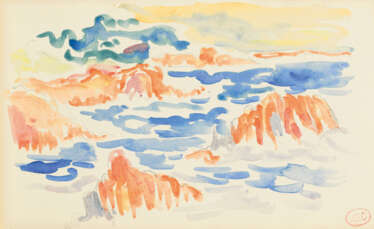Henri Edmond Cross (1856 - 1910) — Auction price
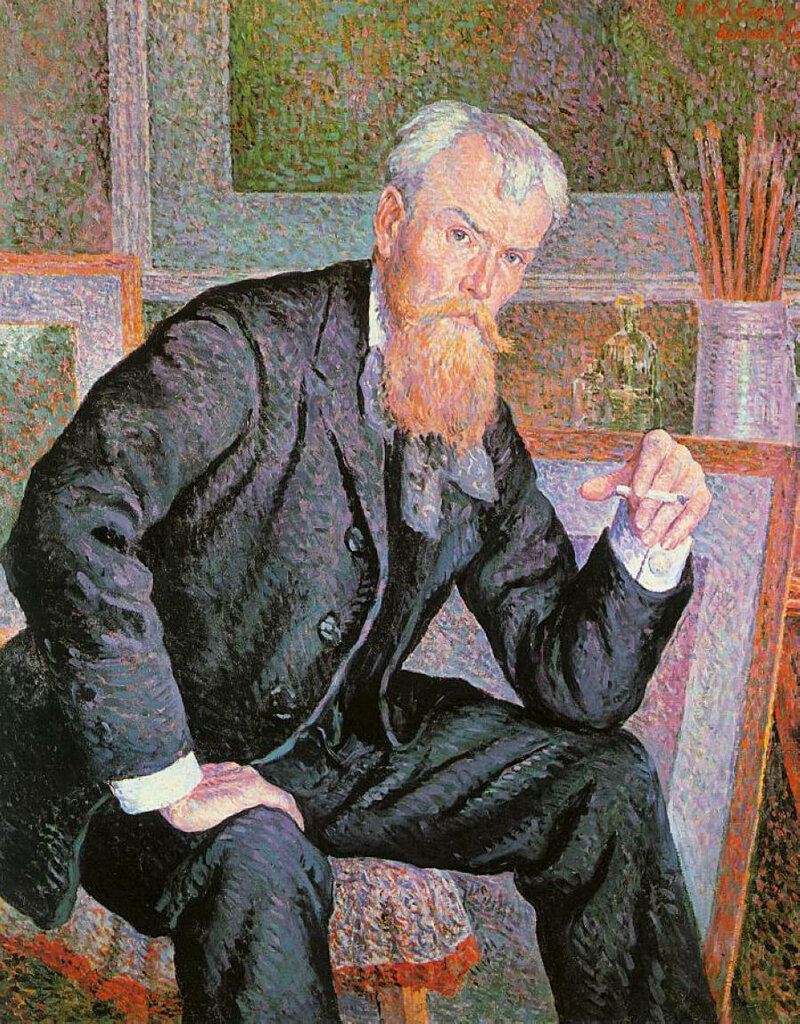
Henri Edmond Cross, a French painter and printmaker, emerged as a pivotal figure in the Neo-Impressionism movement, significantly influencing the realm of modern art. His work, celebrated for its innovative use of color and technique, played a crucial role in transitioning from Pointillism to broader, more expressive brushstrokes, marking a departure from strict naturalism. This evolution allowed for greater personal expression and creativity, profoundly impacting artists like Henri Matisse, who was inspired by Cross's harmonious representations of Arcadian landscapes.
Cross's paintings, characterized by their vibrant color harmonies and lyrical emotion, encapsulate the artist's desire to portray utopian ideals, often reflecting his anarchist beliefs in a hopeful, ideal society. His works, such as "L'air du Soir" and "La Plage de Saint-Clair," showcase his mastery of light and color, embodying the Neo-Impressionist vision of creating harmonies of pure color independent of naturalistic constraints. These pieces not only exemplify Cross's technical prowess but also his philosophical aspirations, intertwining art with social and political ideals.
Despite the challenges posed by his health in later years, Cross's productivity and creativity remained undiminished, leading to significant critical acclaim and commercial success. His solo exhibitions, particularly the one held at Galerie Druet in Paris in 1905, received widespread acclaim, underscoring his influence on the art world and his role in shaping the principles that would guide future movements such as Fauvism.
For collectors and experts in art and antiques, Henri-Edmond Cross's work represents a crucial juncture in the evolution of modern art, offering insights into the transition from the meticulous dots of Pointillism to the expressive freedom of later movements. His legacy is preserved in esteemed institutions like the Musée d'Orsay, where his masterpieces continue to inspire admiration and study.
For those interested in the intersection of art, culture, and history, signing up for updates on sales and auction events related to Henri-Edmond Cross can offer valuable opportunities to engage with the vibrant legacy of this influential artist. This subscription ensures access to the latest offerings and insights into the world of Neo-Impressionism, inviting enthusiasts to deepen their appreciation for Cross's contribution to modern art.


Henri Edmond Cross, a French painter and printmaker, emerged as a pivotal figure in the Neo-Impressionism movement, significantly influencing the realm of modern art. His work, celebrated for its innovative use of color and technique, played a crucial role in transitioning from Pointillism to broader, more expressive brushstrokes, marking a departure from strict naturalism. This evolution allowed for greater personal expression and creativity, profoundly impacting artists like Henri Matisse, who was inspired by Cross's harmonious representations of Arcadian landscapes.
Cross's paintings, characterized by their vibrant color harmonies and lyrical emotion, encapsulate the artist's desire to portray utopian ideals, often reflecting his anarchist beliefs in a hopeful, ideal society. His works, such as "L'air du Soir" and "La Plage de Saint-Clair," showcase his mastery of light and color, embodying the Neo-Impressionist vision of creating harmonies of pure color independent of naturalistic constraints. These pieces not only exemplify Cross's technical prowess but also his philosophical aspirations, intertwining art with social and political ideals.
Despite the challenges posed by his health in later years, Cross's productivity and creativity remained undiminished, leading to significant critical acclaim and commercial success. His solo exhibitions, particularly the one held at Galerie Druet in Paris in 1905, received widespread acclaim, underscoring his influence on the art world and his role in shaping the principles that would guide future movements such as Fauvism.
For collectors and experts in art and antiques, Henri-Edmond Cross's work represents a crucial juncture in the evolution of modern art, offering insights into the transition from the meticulous dots of Pointillism to the expressive freedom of later movements. His legacy is preserved in esteemed institutions like the Musée d'Orsay, where his masterpieces continue to inspire admiration and study.
For those interested in the intersection of art, culture, and history, signing up for updates on sales and auction events related to Henri-Edmond Cross can offer valuable opportunities to engage with the vibrant legacy of this influential artist. This subscription ensures access to the latest offerings and insights into the world of Neo-Impressionism, inviting enthusiasts to deepen their appreciation for Cross's contribution to modern art.
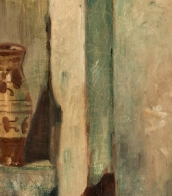

Henri Edmond Cross, a French painter and printmaker, emerged as a pivotal figure in the Neo-Impressionism movement, significantly influencing the realm of modern art. His work, celebrated for its innovative use of color and technique, played a crucial role in transitioning from Pointillism to broader, more expressive brushstrokes, marking a departure from strict naturalism. This evolution allowed for greater personal expression and creativity, profoundly impacting artists like Henri Matisse, who was inspired by Cross's harmonious representations of Arcadian landscapes.
Cross's paintings, characterized by their vibrant color harmonies and lyrical emotion, encapsulate the artist's desire to portray utopian ideals, often reflecting his anarchist beliefs in a hopeful, ideal society. His works, such as "L'air du Soir" and "La Plage de Saint-Clair," showcase his mastery of light and color, embodying the Neo-Impressionist vision of creating harmonies of pure color independent of naturalistic constraints. These pieces not only exemplify Cross's technical prowess but also his philosophical aspirations, intertwining art with social and political ideals.
Despite the challenges posed by his health in later years, Cross's productivity and creativity remained undiminished, leading to significant critical acclaim and commercial success. His solo exhibitions, particularly the one held at Galerie Druet in Paris in 1905, received widespread acclaim, underscoring his influence on the art world and his role in shaping the principles that would guide future movements such as Fauvism.
For collectors and experts in art and antiques, Henri-Edmond Cross's work represents a crucial juncture in the evolution of modern art, offering insights into the transition from the meticulous dots of Pointillism to the expressive freedom of later movements. His legacy is preserved in esteemed institutions like the Musée d'Orsay, where his masterpieces continue to inspire admiration and study.
For those interested in the intersection of art, culture, and history, signing up for updates on sales and auction events related to Henri-Edmond Cross can offer valuable opportunities to engage with the vibrant legacy of this influential artist. This subscription ensures access to the latest offerings and insights into the world of Neo-Impressionism, inviting enthusiasts to deepen their appreciation for Cross's contribution to modern art.
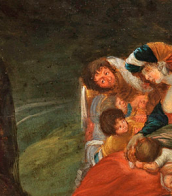

Henri Edmond Cross, a French painter and printmaker, emerged as a pivotal figure in the Neo-Impressionism movement, significantly influencing the realm of modern art. His work, celebrated for its innovative use of color and technique, played a crucial role in transitioning from Pointillism to broader, more expressive brushstrokes, marking a departure from strict naturalism. This evolution allowed for greater personal expression and creativity, profoundly impacting artists like Henri Matisse, who was inspired by Cross's harmonious representations of Arcadian landscapes.
Cross's paintings, characterized by their vibrant color harmonies and lyrical emotion, encapsulate the artist's desire to portray utopian ideals, often reflecting his anarchist beliefs in a hopeful, ideal society. His works, such as "L'air du Soir" and "La Plage de Saint-Clair," showcase his mastery of light and color, embodying the Neo-Impressionist vision of creating harmonies of pure color independent of naturalistic constraints. These pieces not only exemplify Cross's technical prowess but also his philosophical aspirations, intertwining art with social and political ideals.
Despite the challenges posed by his health in later years, Cross's productivity and creativity remained undiminished, leading to significant critical acclaim and commercial success. His solo exhibitions, particularly the one held at Galerie Druet in Paris in 1905, received widespread acclaim, underscoring his influence on the art world and his role in shaping the principles that would guide future movements such as Fauvism.
For collectors and experts in art and antiques, Henri-Edmond Cross's work represents a crucial juncture in the evolution of modern art, offering insights into the transition from the meticulous dots of Pointillism to the expressive freedom of later movements. His legacy is preserved in esteemed institutions like the Musée d'Orsay, where his masterpieces continue to inspire admiration and study.
For those interested in the intersection of art, culture, and history, signing up for updates on sales and auction events related to Henri-Edmond Cross can offer valuable opportunities to engage with the vibrant legacy of this influential artist. This subscription ensures access to the latest offerings and insights into the world of Neo-Impressionism, inviting enthusiasts to deepen their appreciation for Cross's contribution to modern art.
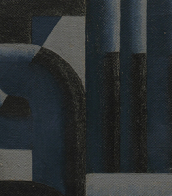

Henri Edmond Cross, a French painter and printmaker, emerged as a pivotal figure in the Neo-Impressionism movement, significantly influencing the realm of modern art. His work, celebrated for its innovative use of color and technique, played a crucial role in transitioning from Pointillism to broader, more expressive brushstrokes, marking a departure from strict naturalism. This evolution allowed for greater personal expression and creativity, profoundly impacting artists like Henri Matisse, who was inspired by Cross's harmonious representations of Arcadian landscapes.
Cross's paintings, characterized by their vibrant color harmonies and lyrical emotion, encapsulate the artist's desire to portray utopian ideals, often reflecting his anarchist beliefs in a hopeful, ideal society. His works, such as "L'air du Soir" and "La Plage de Saint-Clair," showcase his mastery of light and color, embodying the Neo-Impressionist vision of creating harmonies of pure color independent of naturalistic constraints. These pieces not only exemplify Cross's technical prowess but also his philosophical aspirations, intertwining art with social and political ideals.
Despite the challenges posed by his health in later years, Cross's productivity and creativity remained undiminished, leading to significant critical acclaim and commercial success. His solo exhibitions, particularly the one held at Galerie Druet in Paris in 1905, received widespread acclaim, underscoring his influence on the art world and his role in shaping the principles that would guide future movements such as Fauvism.
For collectors and experts in art and antiques, Henri-Edmond Cross's work represents a crucial juncture in the evolution of modern art, offering insights into the transition from the meticulous dots of Pointillism to the expressive freedom of later movements. His legacy is preserved in esteemed institutions like the Musée d'Orsay, where his masterpieces continue to inspire admiration and study.
For those interested in the intersection of art, culture, and history, signing up for updates on sales and auction events related to Henri-Edmond Cross can offer valuable opportunities to engage with the vibrant legacy of this influential artist. This subscription ensures access to the latest offerings and insights into the world of Neo-Impressionism, inviting enthusiasts to deepen their appreciation for Cross's contribution to modern art.


Henri Edmond Cross, a French painter and printmaker, emerged as a pivotal figure in the Neo-Impressionism movement, significantly influencing the realm of modern art. His work, celebrated for its innovative use of color and technique, played a crucial role in transitioning from Pointillism to broader, more expressive brushstrokes, marking a departure from strict naturalism. This evolution allowed for greater personal expression and creativity, profoundly impacting artists like Henri Matisse, who was inspired by Cross's harmonious representations of Arcadian landscapes.
Cross's paintings, characterized by their vibrant color harmonies and lyrical emotion, encapsulate the artist's desire to portray utopian ideals, often reflecting his anarchist beliefs in a hopeful, ideal society. His works, such as "L'air du Soir" and "La Plage de Saint-Clair," showcase his mastery of light and color, embodying the Neo-Impressionist vision of creating harmonies of pure color independent of naturalistic constraints. These pieces not only exemplify Cross's technical prowess but also his philosophical aspirations, intertwining art with social and political ideals.
Despite the challenges posed by his health in later years, Cross's productivity and creativity remained undiminished, leading to significant critical acclaim and commercial success. His solo exhibitions, particularly the one held at Galerie Druet in Paris in 1905, received widespread acclaim, underscoring his influence on the art world and his role in shaping the principles that would guide future movements such as Fauvism.
For collectors and experts in art and antiques, Henri-Edmond Cross's work represents a crucial juncture in the evolution of modern art, offering insights into the transition from the meticulous dots of Pointillism to the expressive freedom of later movements. His legacy is preserved in esteemed institutions like the Musée d'Orsay, where his masterpieces continue to inspire admiration and study.
For those interested in the intersection of art, culture, and history, signing up for updates on sales and auction events related to Henri-Edmond Cross can offer valuable opportunities to engage with the vibrant legacy of this influential artist. This subscription ensures access to the latest offerings and insights into the world of Neo-Impressionism, inviting enthusiasts to deepen their appreciation for Cross's contribution to modern art.
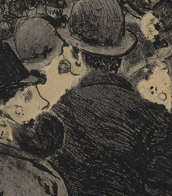

Henri Edmond Cross, a French painter and printmaker, emerged as a pivotal figure in the Neo-Impressionism movement, significantly influencing the realm of modern art. His work, celebrated for its innovative use of color and technique, played a crucial role in transitioning from Pointillism to broader, more expressive brushstrokes, marking a departure from strict naturalism. This evolution allowed for greater personal expression and creativity, profoundly impacting artists like Henri Matisse, who was inspired by Cross's harmonious representations of Arcadian landscapes.
Cross's paintings, characterized by their vibrant color harmonies and lyrical emotion, encapsulate the artist's desire to portray utopian ideals, often reflecting his anarchist beliefs in a hopeful, ideal society. His works, such as "L'air du Soir" and "La Plage de Saint-Clair," showcase his mastery of light and color, embodying the Neo-Impressionist vision of creating harmonies of pure color independent of naturalistic constraints. These pieces not only exemplify Cross's technical prowess but also his philosophical aspirations, intertwining art with social and political ideals.
Despite the challenges posed by his health in later years, Cross's productivity and creativity remained undiminished, leading to significant critical acclaim and commercial success. His solo exhibitions, particularly the one held at Galerie Druet in Paris in 1905, received widespread acclaim, underscoring his influence on the art world and his role in shaping the principles that would guide future movements such as Fauvism.
For collectors and experts in art and antiques, Henri-Edmond Cross's work represents a crucial juncture in the evolution of modern art, offering insights into the transition from the meticulous dots of Pointillism to the expressive freedom of later movements. His legacy is preserved in esteemed institutions like the Musée d'Orsay, where his masterpieces continue to inspire admiration and study.
For those interested in the intersection of art, culture, and history, signing up for updates on sales and auction events related to Henri-Edmond Cross can offer valuable opportunities to engage with the vibrant legacy of this influential artist. This subscription ensures access to the latest offerings and insights into the world of Neo-Impressionism, inviting enthusiasts to deepen their appreciation for Cross's contribution to modern art.
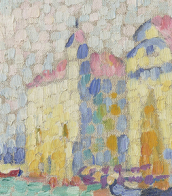

Henri Edmond Cross, a French painter and printmaker, emerged as a pivotal figure in the Neo-Impressionism movement, significantly influencing the realm of modern art. His work, celebrated for its innovative use of color and technique, played a crucial role in transitioning from Pointillism to broader, more expressive brushstrokes, marking a departure from strict naturalism. This evolution allowed for greater personal expression and creativity, profoundly impacting artists like Henri Matisse, who was inspired by Cross's harmonious representations of Arcadian landscapes.
Cross's paintings, characterized by their vibrant color harmonies and lyrical emotion, encapsulate the artist's desire to portray utopian ideals, often reflecting his anarchist beliefs in a hopeful, ideal society. His works, such as "L'air du Soir" and "La Plage de Saint-Clair," showcase his mastery of light and color, embodying the Neo-Impressionist vision of creating harmonies of pure color independent of naturalistic constraints. These pieces not only exemplify Cross's technical prowess but also his philosophical aspirations, intertwining art with social and political ideals.
Despite the challenges posed by his health in later years, Cross's productivity and creativity remained undiminished, leading to significant critical acclaim and commercial success. His solo exhibitions, particularly the one held at Galerie Druet in Paris in 1905, received widespread acclaim, underscoring his influence on the art world and his role in shaping the principles that would guide future movements such as Fauvism.
For collectors and experts in art and antiques, Henri-Edmond Cross's work represents a crucial juncture in the evolution of modern art, offering insights into the transition from the meticulous dots of Pointillism to the expressive freedom of later movements. His legacy is preserved in esteemed institutions like the Musée d'Orsay, where his masterpieces continue to inspire admiration and study.
For those interested in the intersection of art, culture, and history, signing up for updates on sales and auction events related to Henri-Edmond Cross can offer valuable opportunities to engage with the vibrant legacy of this influential artist. This subscription ensures access to the latest offerings and insights into the world of Neo-Impressionism, inviting enthusiasts to deepen their appreciation for Cross's contribution to modern art.
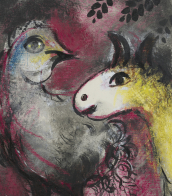

Henri Edmond Cross, a French painter and printmaker, emerged as a pivotal figure in the Neo-Impressionism movement, significantly influencing the realm of modern art. His work, celebrated for its innovative use of color and technique, played a crucial role in transitioning from Pointillism to broader, more expressive brushstrokes, marking a departure from strict naturalism. This evolution allowed for greater personal expression and creativity, profoundly impacting artists like Henri Matisse, who was inspired by Cross's harmonious representations of Arcadian landscapes.
Cross's paintings, characterized by their vibrant color harmonies and lyrical emotion, encapsulate the artist's desire to portray utopian ideals, often reflecting his anarchist beliefs in a hopeful, ideal society. His works, such as "L'air du Soir" and "La Plage de Saint-Clair," showcase his mastery of light and color, embodying the Neo-Impressionist vision of creating harmonies of pure color independent of naturalistic constraints. These pieces not only exemplify Cross's technical prowess but also his philosophical aspirations, intertwining art with social and political ideals.
Despite the challenges posed by his health in later years, Cross's productivity and creativity remained undiminished, leading to significant critical acclaim and commercial success. His solo exhibitions, particularly the one held at Galerie Druet in Paris in 1905, received widespread acclaim, underscoring his influence on the art world and his role in shaping the principles that would guide future movements such as Fauvism.
For collectors and experts in art and antiques, Henri-Edmond Cross's work represents a crucial juncture in the evolution of modern art, offering insights into the transition from the meticulous dots of Pointillism to the expressive freedom of later movements. His legacy is preserved in esteemed institutions like the Musée d'Orsay, where his masterpieces continue to inspire admiration and study.
For those interested in the intersection of art, culture, and history, signing up for updates on sales and auction events related to Henri-Edmond Cross can offer valuable opportunities to engage with the vibrant legacy of this influential artist. This subscription ensures access to the latest offerings and insights into the world of Neo-Impressionism, inviting enthusiasts to deepen their appreciation for Cross's contribution to modern art.
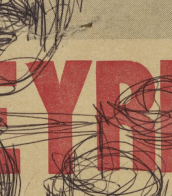

Henri Edmond Cross, a French painter and printmaker, emerged as a pivotal figure in the Neo-Impressionism movement, significantly influencing the realm of modern art. His work, celebrated for its innovative use of color and technique, played a crucial role in transitioning from Pointillism to broader, more expressive brushstrokes, marking a departure from strict naturalism. This evolution allowed for greater personal expression and creativity, profoundly impacting artists like Henri Matisse, who was inspired by Cross's harmonious representations of Arcadian landscapes.
Cross's paintings, characterized by their vibrant color harmonies and lyrical emotion, encapsulate the artist's desire to portray utopian ideals, often reflecting his anarchist beliefs in a hopeful, ideal society. His works, such as "L'air du Soir" and "La Plage de Saint-Clair," showcase his mastery of light and color, embodying the Neo-Impressionist vision of creating harmonies of pure color independent of naturalistic constraints. These pieces not only exemplify Cross's technical prowess but also his philosophical aspirations, intertwining art with social and political ideals.
Despite the challenges posed by his health in later years, Cross's productivity and creativity remained undiminished, leading to significant critical acclaim and commercial success. His solo exhibitions, particularly the one held at Galerie Druet in Paris in 1905, received widespread acclaim, underscoring his influence on the art world and his role in shaping the principles that would guide future movements such as Fauvism.
For collectors and experts in art and antiques, Henri-Edmond Cross's work represents a crucial juncture in the evolution of modern art, offering insights into the transition from the meticulous dots of Pointillism to the expressive freedom of later movements. His legacy is preserved in esteemed institutions like the Musée d'Orsay, where his masterpieces continue to inspire admiration and study.
For those interested in the intersection of art, culture, and history, signing up for updates on sales and auction events related to Henri-Edmond Cross can offer valuable opportunities to engage with the vibrant legacy of this influential artist. This subscription ensures access to the latest offerings and insights into the world of Neo-Impressionism, inviting enthusiasts to deepen their appreciation for Cross's contribution to modern art.


Henri Edmond Cross, a French painter and printmaker, emerged as a pivotal figure in the Neo-Impressionism movement, significantly influencing the realm of modern art. His work, celebrated for its innovative use of color and technique, played a crucial role in transitioning from Pointillism to broader, more expressive brushstrokes, marking a departure from strict naturalism. This evolution allowed for greater personal expression and creativity, profoundly impacting artists like Henri Matisse, who was inspired by Cross's harmonious representations of Arcadian landscapes.
Cross's paintings, characterized by their vibrant color harmonies and lyrical emotion, encapsulate the artist's desire to portray utopian ideals, often reflecting his anarchist beliefs in a hopeful, ideal society. His works, such as "L'air du Soir" and "La Plage de Saint-Clair," showcase his mastery of light and color, embodying the Neo-Impressionist vision of creating harmonies of pure color independent of naturalistic constraints. These pieces not only exemplify Cross's technical prowess but also his philosophical aspirations, intertwining art with social and political ideals.
Despite the challenges posed by his health in later years, Cross's productivity and creativity remained undiminished, leading to significant critical acclaim and commercial success. His solo exhibitions, particularly the one held at Galerie Druet in Paris in 1905, received widespread acclaim, underscoring his influence on the art world and his role in shaping the principles that would guide future movements such as Fauvism.
For collectors and experts in art and antiques, Henri-Edmond Cross's work represents a crucial juncture in the evolution of modern art, offering insights into the transition from the meticulous dots of Pointillism to the expressive freedom of later movements. His legacy is preserved in esteemed institutions like the Musée d'Orsay, where his masterpieces continue to inspire admiration and study.
For those interested in the intersection of art, culture, and history, signing up for updates on sales and auction events related to Henri-Edmond Cross can offer valuable opportunities to engage with the vibrant legacy of this influential artist. This subscription ensures access to the latest offerings and insights into the world of Neo-Impressionism, inviting enthusiasts to deepen their appreciation for Cross's contribution to modern art.
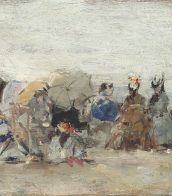

Henri Edmond Cross, a French painter and printmaker, emerged as a pivotal figure in the Neo-Impressionism movement, significantly influencing the realm of modern art. His work, celebrated for its innovative use of color and technique, played a crucial role in transitioning from Pointillism to broader, more expressive brushstrokes, marking a departure from strict naturalism. This evolution allowed for greater personal expression and creativity, profoundly impacting artists like Henri Matisse, who was inspired by Cross's harmonious representations of Arcadian landscapes.
Cross's paintings, characterized by their vibrant color harmonies and lyrical emotion, encapsulate the artist's desire to portray utopian ideals, often reflecting his anarchist beliefs in a hopeful, ideal society. His works, such as "L'air du Soir" and "La Plage de Saint-Clair," showcase his mastery of light and color, embodying the Neo-Impressionist vision of creating harmonies of pure color independent of naturalistic constraints. These pieces not only exemplify Cross's technical prowess but also his philosophical aspirations, intertwining art with social and political ideals.
Despite the challenges posed by his health in later years, Cross's productivity and creativity remained undiminished, leading to significant critical acclaim and commercial success. His solo exhibitions, particularly the one held at Galerie Druet in Paris in 1905, received widespread acclaim, underscoring his influence on the art world and his role in shaping the principles that would guide future movements such as Fauvism.
For collectors and experts in art and antiques, Henri-Edmond Cross's work represents a crucial juncture in the evolution of modern art, offering insights into the transition from the meticulous dots of Pointillism to the expressive freedom of later movements. His legacy is preserved in esteemed institutions like the Musée d'Orsay, where his masterpieces continue to inspire admiration and study.
For those interested in the intersection of art, culture, and history, signing up for updates on sales and auction events related to Henri-Edmond Cross can offer valuable opportunities to engage with the vibrant legacy of this influential artist. This subscription ensures access to the latest offerings and insights into the world of Neo-Impressionism, inviting enthusiasts to deepen their appreciation for Cross's contribution to modern art.
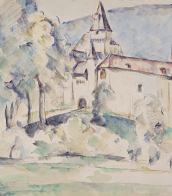

Henri Edmond Cross, a French painter and printmaker, emerged as a pivotal figure in the Neo-Impressionism movement, significantly influencing the realm of modern art. His work, celebrated for its innovative use of color and technique, played a crucial role in transitioning from Pointillism to broader, more expressive brushstrokes, marking a departure from strict naturalism. This evolution allowed for greater personal expression and creativity, profoundly impacting artists like Henri Matisse, who was inspired by Cross's harmonious representations of Arcadian landscapes.
Cross's paintings, characterized by their vibrant color harmonies and lyrical emotion, encapsulate the artist's desire to portray utopian ideals, often reflecting his anarchist beliefs in a hopeful, ideal society. His works, such as "L'air du Soir" and "La Plage de Saint-Clair," showcase his mastery of light and color, embodying the Neo-Impressionist vision of creating harmonies of pure color independent of naturalistic constraints. These pieces not only exemplify Cross's technical prowess but also his philosophical aspirations, intertwining art with social and political ideals.
Despite the challenges posed by his health in later years, Cross's productivity and creativity remained undiminished, leading to significant critical acclaim and commercial success. His solo exhibitions, particularly the one held at Galerie Druet in Paris in 1905, received widespread acclaim, underscoring his influence on the art world and his role in shaping the principles that would guide future movements such as Fauvism.
For collectors and experts in art and antiques, Henri-Edmond Cross's work represents a crucial juncture in the evolution of modern art, offering insights into the transition from the meticulous dots of Pointillism to the expressive freedom of later movements. His legacy is preserved in esteemed institutions like the Musée d'Orsay, where his masterpieces continue to inspire admiration and study.
For those interested in the intersection of art, culture, and history, signing up for updates on sales and auction events related to Henri-Edmond Cross can offer valuable opportunities to engage with the vibrant legacy of this influential artist. This subscription ensures access to the latest offerings and insights into the world of Neo-Impressionism, inviting enthusiasts to deepen their appreciation for Cross's contribution to modern art.
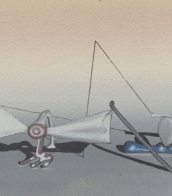

Henri Edmond Cross, a French painter and printmaker, emerged as a pivotal figure in the Neo-Impressionism movement, significantly influencing the realm of modern art. His work, celebrated for its innovative use of color and technique, played a crucial role in transitioning from Pointillism to broader, more expressive brushstrokes, marking a departure from strict naturalism. This evolution allowed for greater personal expression and creativity, profoundly impacting artists like Henri Matisse, who was inspired by Cross's harmonious representations of Arcadian landscapes.
Cross's paintings, characterized by their vibrant color harmonies and lyrical emotion, encapsulate the artist's desire to portray utopian ideals, often reflecting his anarchist beliefs in a hopeful, ideal society. His works, such as "L'air du Soir" and "La Plage de Saint-Clair," showcase his mastery of light and color, embodying the Neo-Impressionist vision of creating harmonies of pure color independent of naturalistic constraints. These pieces not only exemplify Cross's technical prowess but also his philosophical aspirations, intertwining art with social and political ideals.
Despite the challenges posed by his health in later years, Cross's productivity and creativity remained undiminished, leading to significant critical acclaim and commercial success. His solo exhibitions, particularly the one held at Galerie Druet in Paris in 1905, received widespread acclaim, underscoring his influence on the art world and his role in shaping the principles that would guide future movements such as Fauvism.
For collectors and experts in art and antiques, Henri-Edmond Cross's work represents a crucial juncture in the evolution of modern art, offering insights into the transition from the meticulous dots of Pointillism to the expressive freedom of later movements. His legacy is preserved in esteemed institutions like the Musée d'Orsay, where his masterpieces continue to inspire admiration and study.
For those interested in the intersection of art, culture, and history, signing up for updates on sales and auction events related to Henri-Edmond Cross can offer valuable opportunities to engage with the vibrant legacy of this influential artist. This subscription ensures access to the latest offerings and insights into the world of Neo-Impressionism, inviting enthusiasts to deepen their appreciation for Cross's contribution to modern art.
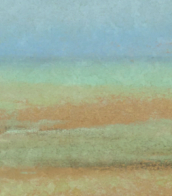

Henri Edmond Cross, a French painter and printmaker, emerged as a pivotal figure in the Neo-Impressionism movement, significantly influencing the realm of modern art. His work, celebrated for its innovative use of color and technique, played a crucial role in transitioning from Pointillism to broader, more expressive brushstrokes, marking a departure from strict naturalism. This evolution allowed for greater personal expression and creativity, profoundly impacting artists like Henri Matisse, who was inspired by Cross's harmonious representations of Arcadian landscapes.
Cross's paintings, characterized by their vibrant color harmonies and lyrical emotion, encapsulate the artist's desire to portray utopian ideals, often reflecting his anarchist beliefs in a hopeful, ideal society. His works, such as "L'air du Soir" and "La Plage de Saint-Clair," showcase his mastery of light and color, embodying the Neo-Impressionist vision of creating harmonies of pure color independent of naturalistic constraints. These pieces not only exemplify Cross's technical prowess but also his philosophical aspirations, intertwining art with social and political ideals.
Despite the challenges posed by his health in later years, Cross's productivity and creativity remained undiminished, leading to significant critical acclaim and commercial success. His solo exhibitions, particularly the one held at Galerie Druet in Paris in 1905, received widespread acclaim, underscoring his influence on the art world and his role in shaping the principles that would guide future movements such as Fauvism.
For collectors and experts in art and antiques, Henri-Edmond Cross's work represents a crucial juncture in the evolution of modern art, offering insights into the transition from the meticulous dots of Pointillism to the expressive freedom of later movements. His legacy is preserved in esteemed institutions like the Musée d'Orsay, where his masterpieces continue to inspire admiration and study.
For those interested in the intersection of art, culture, and history, signing up for updates on sales and auction events related to Henri-Edmond Cross can offer valuable opportunities to engage with the vibrant legacy of this influential artist. This subscription ensures access to the latest offerings and insights into the world of Neo-Impressionism, inviting enthusiasts to deepen their appreciation for Cross's contribution to modern art.
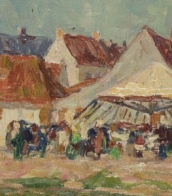

Henri Edmond Cross, a French painter and printmaker, emerged as a pivotal figure in the Neo-Impressionism movement, significantly influencing the realm of modern art. His work, celebrated for its innovative use of color and technique, played a crucial role in transitioning from Pointillism to broader, more expressive brushstrokes, marking a departure from strict naturalism. This evolution allowed for greater personal expression and creativity, profoundly impacting artists like Henri Matisse, who was inspired by Cross's harmonious representations of Arcadian landscapes.
Cross's paintings, characterized by their vibrant color harmonies and lyrical emotion, encapsulate the artist's desire to portray utopian ideals, often reflecting his anarchist beliefs in a hopeful, ideal society. His works, such as "L'air du Soir" and "La Plage de Saint-Clair," showcase his mastery of light and color, embodying the Neo-Impressionist vision of creating harmonies of pure color independent of naturalistic constraints. These pieces not only exemplify Cross's technical prowess but also his philosophical aspirations, intertwining art with social and political ideals.
Despite the challenges posed by his health in later years, Cross's productivity and creativity remained undiminished, leading to significant critical acclaim and commercial success. His solo exhibitions, particularly the one held at Galerie Druet in Paris in 1905, received widespread acclaim, underscoring his influence on the art world and his role in shaping the principles that would guide future movements such as Fauvism.
For collectors and experts in art and antiques, Henri-Edmond Cross's work represents a crucial juncture in the evolution of modern art, offering insights into the transition from the meticulous dots of Pointillism to the expressive freedom of later movements. His legacy is preserved in esteemed institutions like the Musée d'Orsay, where his masterpieces continue to inspire admiration and study.
For those interested in the intersection of art, culture, and history, signing up for updates on sales and auction events related to Henri-Edmond Cross can offer valuable opportunities to engage with the vibrant legacy of this influential artist. This subscription ensures access to the latest offerings and insights into the world of Neo-Impressionism, inviting enthusiasts to deepen their appreciation for Cross's contribution to modern art.


Henri Edmond Cross, a French painter and printmaker, emerged as a pivotal figure in the Neo-Impressionism movement, significantly influencing the realm of modern art. His work, celebrated for its innovative use of color and technique, played a crucial role in transitioning from Pointillism to broader, more expressive brushstrokes, marking a departure from strict naturalism. This evolution allowed for greater personal expression and creativity, profoundly impacting artists like Henri Matisse, who was inspired by Cross's harmonious representations of Arcadian landscapes.
Cross's paintings, characterized by their vibrant color harmonies and lyrical emotion, encapsulate the artist's desire to portray utopian ideals, often reflecting his anarchist beliefs in a hopeful, ideal society. His works, such as "L'air du Soir" and "La Plage de Saint-Clair," showcase his mastery of light and color, embodying the Neo-Impressionist vision of creating harmonies of pure color independent of naturalistic constraints. These pieces not only exemplify Cross's technical prowess but also his philosophical aspirations, intertwining art with social and political ideals.
Despite the challenges posed by his health in later years, Cross's productivity and creativity remained undiminished, leading to significant critical acclaim and commercial success. His solo exhibitions, particularly the one held at Galerie Druet in Paris in 1905, received widespread acclaim, underscoring his influence on the art world and his role in shaping the principles that would guide future movements such as Fauvism.
For collectors and experts in art and antiques, Henri-Edmond Cross's work represents a crucial juncture in the evolution of modern art, offering insights into the transition from the meticulous dots of Pointillism to the expressive freedom of later movements. His legacy is preserved in esteemed institutions like the Musée d'Orsay, where his masterpieces continue to inspire admiration and study.
For those interested in the intersection of art, culture, and history, signing up for updates on sales and auction events related to Henri-Edmond Cross can offer valuable opportunities to engage with the vibrant legacy of this influential artist. This subscription ensures access to the latest offerings and insights into the world of Neo-Impressionism, inviting enthusiasts to deepen their appreciation for Cross's contribution to modern art.
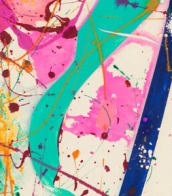

Henri Edmond Cross, a French painter and printmaker, emerged as a pivotal figure in the Neo-Impressionism movement, significantly influencing the realm of modern art. His work, celebrated for its innovative use of color and technique, played a crucial role in transitioning from Pointillism to broader, more expressive brushstrokes, marking a departure from strict naturalism. This evolution allowed for greater personal expression and creativity, profoundly impacting artists like Henri Matisse, who was inspired by Cross's harmonious representations of Arcadian landscapes.
Cross's paintings, characterized by their vibrant color harmonies and lyrical emotion, encapsulate the artist's desire to portray utopian ideals, often reflecting his anarchist beliefs in a hopeful, ideal society. His works, such as "L'air du Soir" and "La Plage de Saint-Clair," showcase his mastery of light and color, embodying the Neo-Impressionist vision of creating harmonies of pure color independent of naturalistic constraints. These pieces not only exemplify Cross's technical prowess but also his philosophical aspirations, intertwining art with social and political ideals.
Despite the challenges posed by his health in later years, Cross's productivity and creativity remained undiminished, leading to significant critical acclaim and commercial success. His solo exhibitions, particularly the one held at Galerie Druet in Paris in 1905, received widespread acclaim, underscoring his influence on the art world and his role in shaping the principles that would guide future movements such as Fauvism.
For collectors and experts in art and antiques, Henri-Edmond Cross's work represents a crucial juncture in the evolution of modern art, offering insights into the transition from the meticulous dots of Pointillism to the expressive freedom of later movements. His legacy is preserved in esteemed institutions like the Musée d'Orsay, where his masterpieces continue to inspire admiration and study.
For those interested in the intersection of art, culture, and history, signing up for updates on sales and auction events related to Henri-Edmond Cross can offer valuable opportunities to engage with the vibrant legacy of this influential artist. This subscription ensures access to the latest offerings and insights into the world of Neo-Impressionism, inviting enthusiasts to deepen their appreciation for Cross's contribution to modern art.
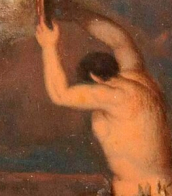

Henri Edmond Cross, a French painter and printmaker, emerged as a pivotal figure in the Neo-Impressionism movement, significantly influencing the realm of modern art. His work, celebrated for its innovative use of color and technique, played a crucial role in transitioning from Pointillism to broader, more expressive brushstrokes, marking a departure from strict naturalism. This evolution allowed for greater personal expression and creativity, profoundly impacting artists like Henri Matisse, who was inspired by Cross's harmonious representations of Arcadian landscapes.
Cross's paintings, characterized by their vibrant color harmonies and lyrical emotion, encapsulate the artist's desire to portray utopian ideals, often reflecting his anarchist beliefs in a hopeful, ideal society. His works, such as "L'air du Soir" and "La Plage de Saint-Clair," showcase his mastery of light and color, embodying the Neo-Impressionist vision of creating harmonies of pure color independent of naturalistic constraints. These pieces not only exemplify Cross's technical prowess but also his philosophical aspirations, intertwining art with social and political ideals.
Despite the challenges posed by his health in later years, Cross's productivity and creativity remained undiminished, leading to significant critical acclaim and commercial success. His solo exhibitions, particularly the one held at Galerie Druet in Paris in 1905, received widespread acclaim, underscoring his influence on the art world and his role in shaping the principles that would guide future movements such as Fauvism.
For collectors and experts in art and antiques, Henri-Edmond Cross's work represents a crucial juncture in the evolution of modern art, offering insights into the transition from the meticulous dots of Pointillism to the expressive freedom of later movements. His legacy is preserved in esteemed institutions like the Musée d'Orsay, where his masterpieces continue to inspire admiration and study.
For those interested in the intersection of art, culture, and history, signing up for updates on sales and auction events related to Henri-Edmond Cross can offer valuable opportunities to engage with the vibrant legacy of this influential artist. This subscription ensures access to the latest offerings and insights into the world of Neo-Impressionism, inviting enthusiasts to deepen their appreciation for Cross's contribution to modern art.
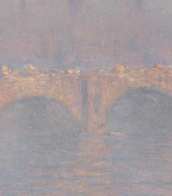

Henri Edmond Cross, a French painter and printmaker, emerged as a pivotal figure in the Neo-Impressionism movement, significantly influencing the realm of modern art. His work, celebrated for its innovative use of color and technique, played a crucial role in transitioning from Pointillism to broader, more expressive brushstrokes, marking a departure from strict naturalism. This evolution allowed for greater personal expression and creativity, profoundly impacting artists like Henri Matisse, who was inspired by Cross's harmonious representations of Arcadian landscapes.
Cross's paintings, characterized by their vibrant color harmonies and lyrical emotion, encapsulate the artist's desire to portray utopian ideals, often reflecting his anarchist beliefs in a hopeful, ideal society. His works, such as "L'air du Soir" and "La Plage de Saint-Clair," showcase his mastery of light and color, embodying the Neo-Impressionist vision of creating harmonies of pure color independent of naturalistic constraints. These pieces not only exemplify Cross's technical prowess but also his philosophical aspirations, intertwining art with social and political ideals.
Despite the challenges posed by his health in later years, Cross's productivity and creativity remained undiminished, leading to significant critical acclaim and commercial success. His solo exhibitions, particularly the one held at Galerie Druet in Paris in 1905, received widespread acclaim, underscoring his influence on the art world and his role in shaping the principles that would guide future movements such as Fauvism.
For collectors and experts in art and antiques, Henri-Edmond Cross's work represents a crucial juncture in the evolution of modern art, offering insights into the transition from the meticulous dots of Pointillism to the expressive freedom of later movements. His legacy is preserved in esteemed institutions like the Musée d'Orsay, where his masterpieces continue to inspire admiration and study.
For those interested in the intersection of art, culture, and history, signing up for updates on sales and auction events related to Henri-Edmond Cross can offer valuable opportunities to engage with the vibrant legacy of this influential artist. This subscription ensures access to the latest offerings and insights into the world of Neo-Impressionism, inviting enthusiasts to deepen their appreciation for Cross's contribution to modern art.
